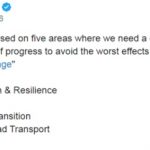A new study assesses the most recent adaptation plans of 167 European cities. Six “principles” - evidence of impacts and risks; adaptation goals; adaptation measures; implementation; monitoring and evaluation; societal participation in plan creation – are used to quantify performance. The authors – Diana Reckien, University of Twente; Attila Buzási, Budapest University of Technology and Economics; Marta Olazabal, Basque Centre for Climate Change; … [Read more...]
COP 27: “Loss & Damage” can become the fourth pillar of climate action, along with mitigation, adaptation and finance
COP27 saw two major outcomes on the finance front: the creation of a “Loss and Damage” fund and a call to reform international financial institutions. It made fewer, if any, advances to reduce emissions, and narrowly missed sending a global call to phase down oil and gas consumption. But funding the emissions reductions of developing and vulnerable nations was a gap that had to be filled, and so this is a big step forward, explains Lola Vallejo … [Read more...]
Tools to design energy systems resilient to natural disasters: from small villages to big cities
There is little doubt that emissions reduction will not be enough to cope with climate change. Adaptation will be essential too. Connor O’Neil and Moriah Petty at NREL describe how the National Renewable Energy Laboratory is developing free-to-use tools to help configure and create energy systems that are resilient to natural disasters. The tools have already been applied to small and large populations, ranging from a 500-person town to big … [Read more...]
COP 27: an analysis of what gets prioritised and ignored at UN climate negotiations
Getting an issue on the agenda of a COP is essential for its chances of being dealt with properly. Jennifer Allan at Cardiff University and Rishikesh Ram Bhandary at Boston University, writing for Carbon Brief, have analysed 218 agendas, tracking 502 agenda sub-items, going back to the first COP in Berlin in 1995. Certain agendas stand out – Adaptation, Mitigation, Finance, Transparency, Technology, Capacity Building, Response Measures, … [Read more...]
“New Collective Quantified Goal”: how much should rich nations pay developing nations for climate mitigation?
Is the $100bn a year promised by rich nations to developing ones to assist their climate mitigation plans enough? Almost certainly not, explains Mahlet Eyassu Melkie at Rocky Mountain Institute. That number was pretty much plucked out of the air for political reasons. To come to an evidence-based number, a great deal of assessment, analysis and finally agreement is needed internationally. That process is called the New Collective Quantified Goal … [Read more...]
IPCC Report on Adaptation: a rapidly closing policy window for climate change action
We do not know how successful we will be at cutting emissions. So “adaptation” is how we change our behaviour, economies, infrastructure and planning to cope with the consequences of climate change. The IPCC’s 6th and latest report looks at the scientific evidence of climate risk and the adaptation solutions being pursued around the world. Alexandre Magnan at IDDRI summarises the findings. It says that by 2100 climate risk will increase two- to … [Read more...]
UK: exposing the gap between ambitious climate laws and actual policies
Like many nations, the UK has big gaps between what is actually needed to reach net zero by 2050, what targets and ambitions have actually passed into law, and what policies are actually in place to comply with those laws. The UK’s climate watchdog, the Climate Change Committee (CCC), has issued two reports that measure the UK’s performance and makes recommendations, summarised here by Josh Gabbatiss at Carbon Brief. The first report focuses on … [Read more...]
EU-India cooperation: how to tap the large potential for climate action
India is the world’s fifth largest economy, the second most populous, and over the next few decades is expected to see energy demand grow more than any other country. Ritu Ahuja and Mekhala Sastry at TERI, Abhishek Kaushik at the Centre for Global Environment Research, and Alexandra Deprez and Lola Vallejo at IDDRI look at India’s challenges and which areas show the most potential for partnership with the EU. They focus on five themes: energy, … [Read more...]
UK’s COP26 Presidency will be the first big test of its post-Brexit diplomatic skills
November’s COP26 will arguably be the most important since the Paris Climate Agreement of 2015. By then, all signatory nations are required to submit their new and improved nationally determined contributions (NDCs) that set a credible pathway towards reducing their emissions. So far only the Marshall Islands, Suriname, and Norway have done so. Lucien Chabason and Lola Vallejo at IDDRI ask whether the UK teams behind their new COP26 President, … [Read more...]










